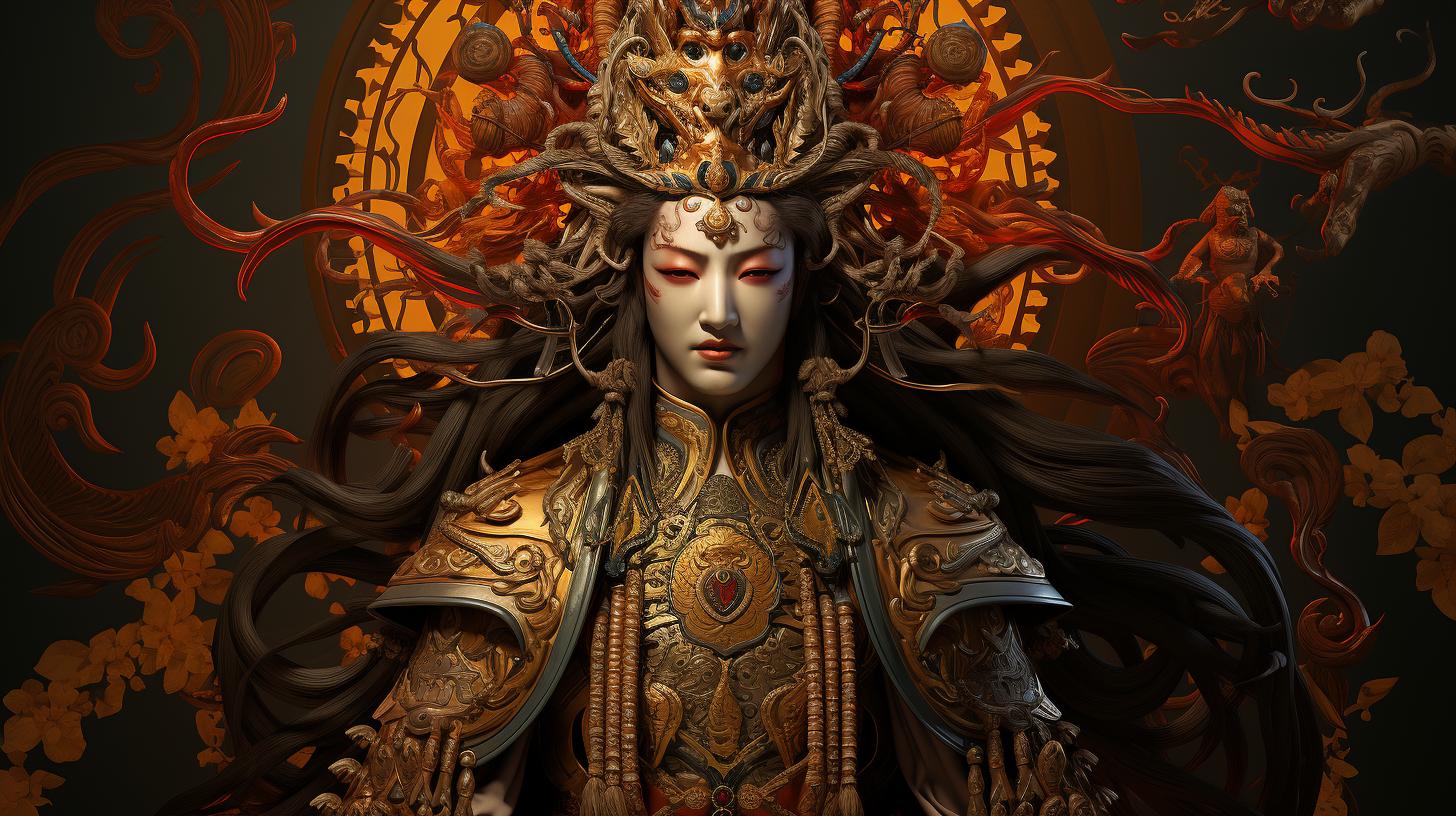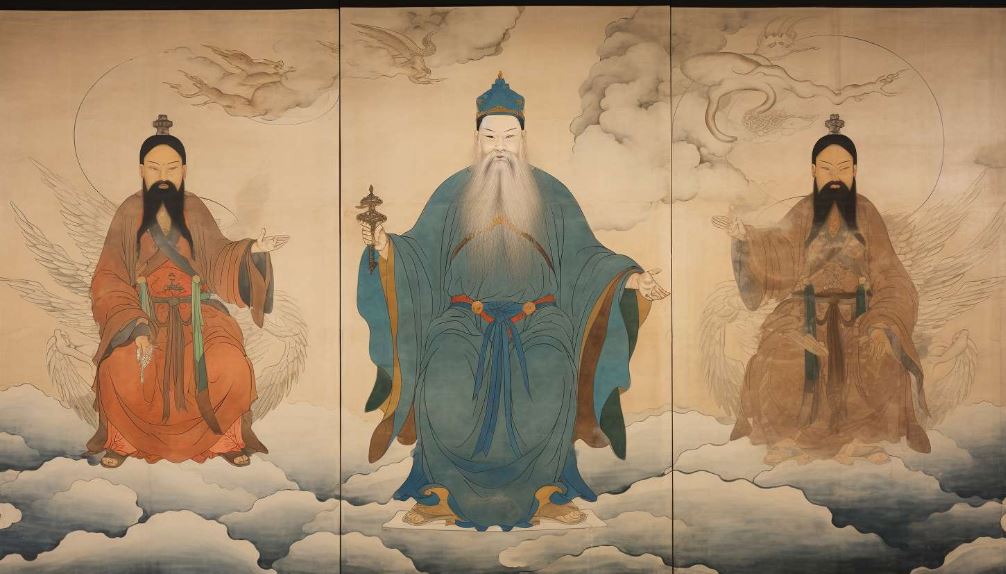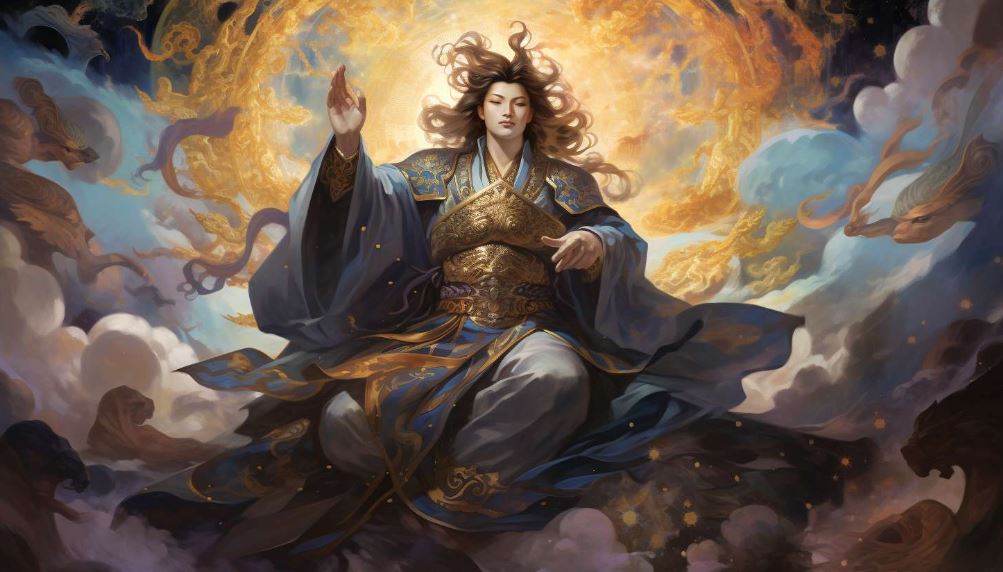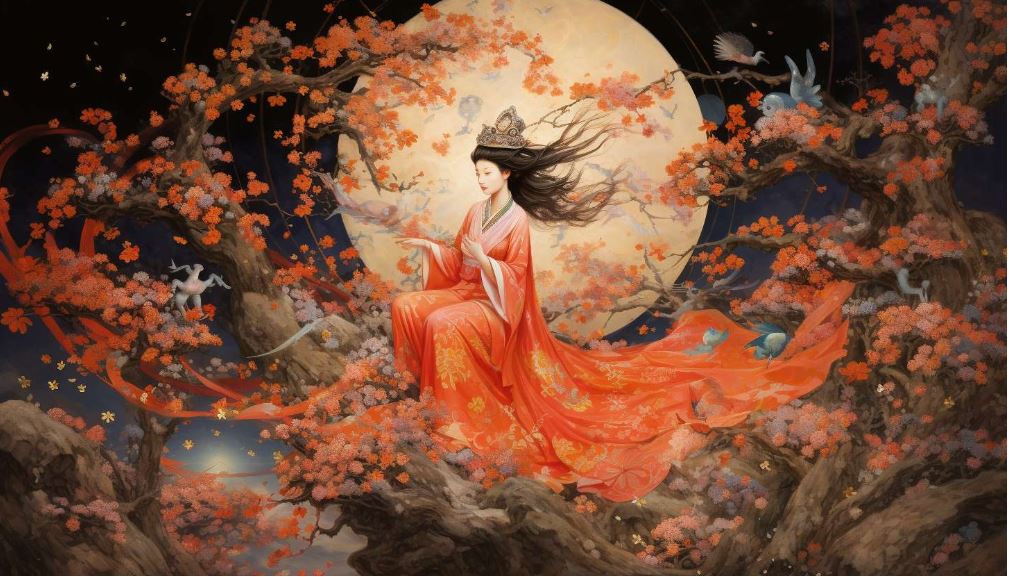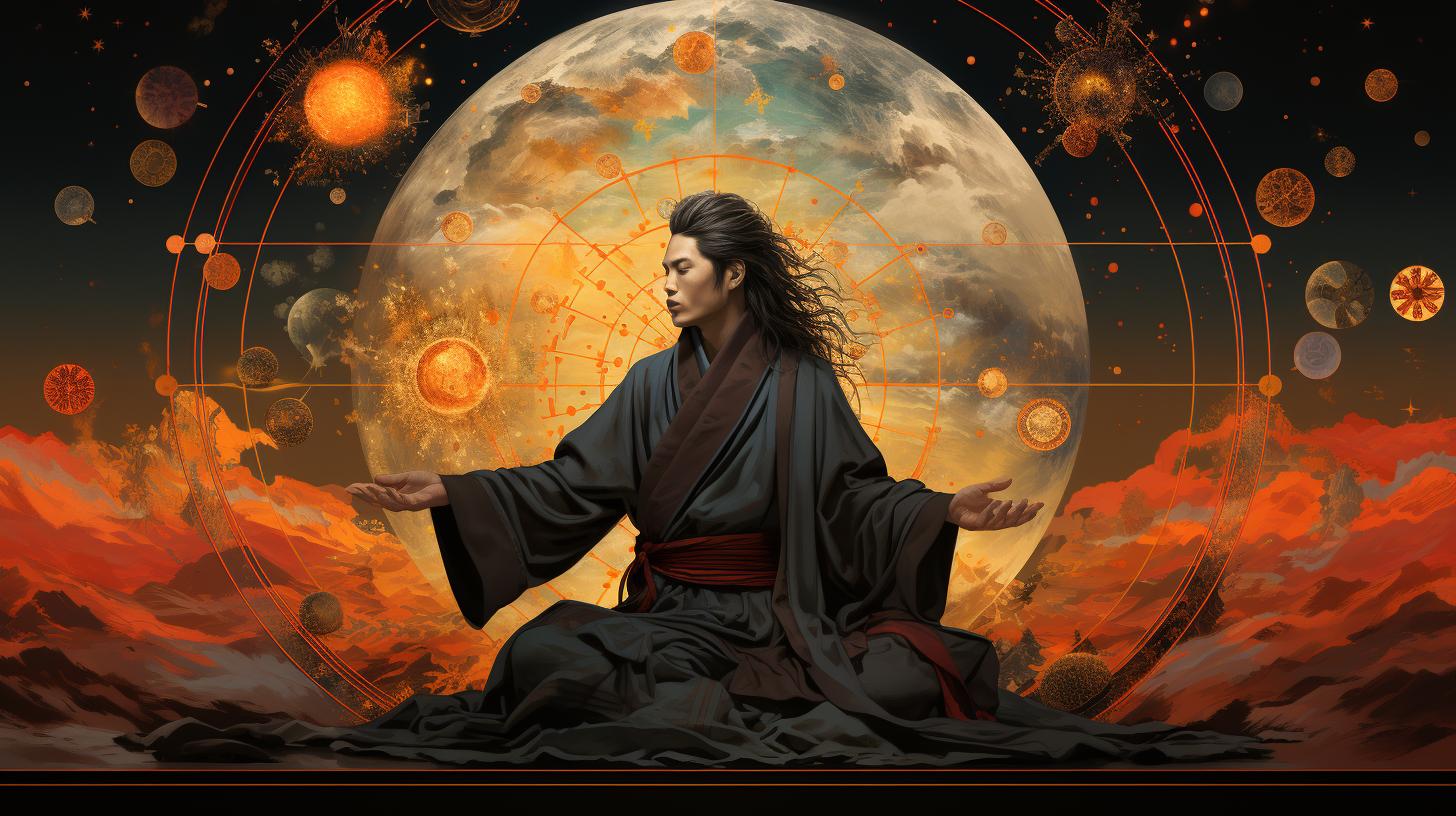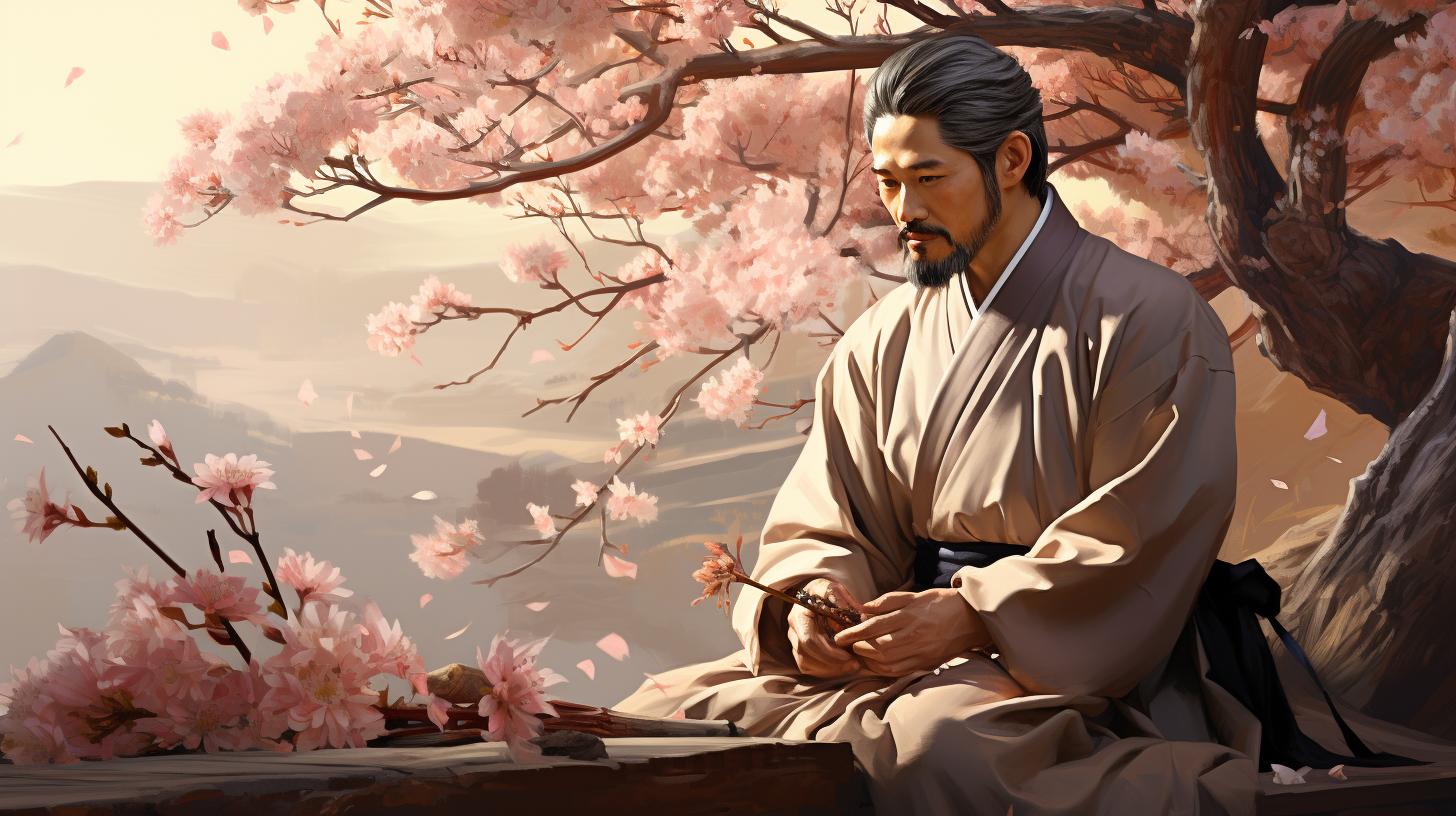Hwanin God: The Supreme Being in Korean Native Religion and Shamanism
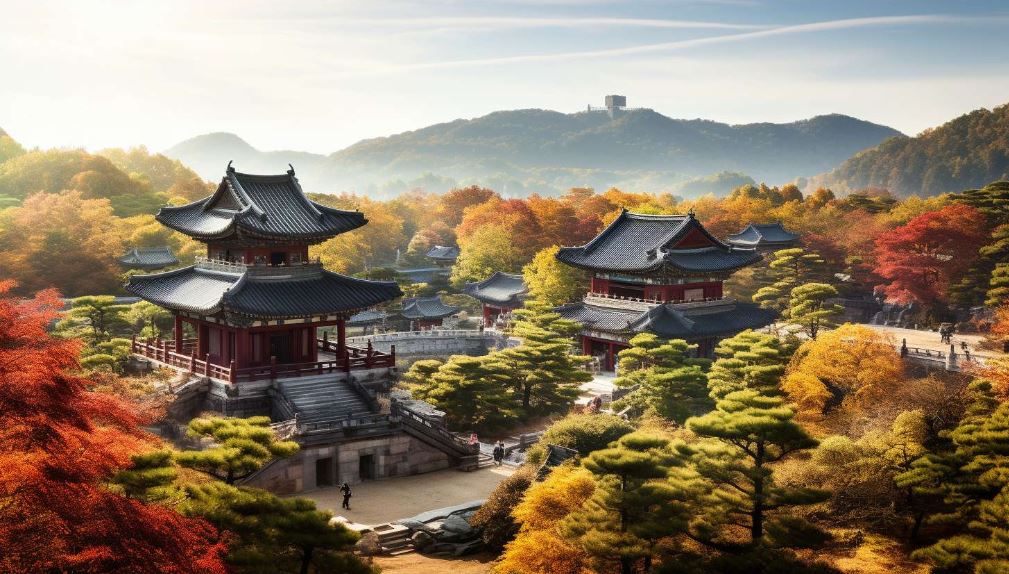
Hwanin God, also known as Haneullim or Sang-Je, holds great significance in Korean Native Religion and Shamanism. Hwanin is revered as the supreme being and the origin of all beings.
He is the father of Dangun, the first human king and shaman in Korea.
According to mythology, Hwanin sent his son to Earth to establish a sacred city. The worship of Haneullim and other ancestral gods is an integral part of Korean religious practices.
Hwanin’s role as a father and ancestor of shamans is highly respected.
In Sinist theology, Hwanin is portrayed as the creator, master, and god king. The myth of the transformation and birth of Dangun by an osa and a tiger further adds to Hwanin’s significance.
Stay tuned for a closer exploration of Hwanin’s role, mythology, and cultural importance.
Background of Hwanin God in Korean Native Religion and Shamanism
Hwanin God holds a significant role in Korean Native Religion and Shamanism. He is revered as the supreme being and the originator of all beings. Hwanin is deeply intertwined with the cultural and mythological history of Korea, serving as the father of Dangun, the first human king and shaman.
His divine presence is perceived as the ultimate source of power and wisdom.
In Korean mythology, Hwanin is associated with the heavenly realm and is believed to have descended to Earth to establish a sacred city on Mount Taebaek. This act marked the beginning of human civilization and the birth of a lineage of shamans.
The worship and adoration of Haneullim, as Hwanin is also known, play a central role in the religious practices of Korean communities.
Furthermore, Hwanin’s prominence extends beyond Korean native religion. In Sinist theology, he is regarded as the creator of the universe, Hwanung as the master of nature, and Dangun as the god king who governs in harmony with the natural order.
As the supreme being, Hwanin stands as a symbol of ultimate power and wisdom.
Hwanin represents the transcendental force behind the creation and existence of all living creatures. He is believed to have descended from the heavens to the sacred earth, bestowing his divine influence upon humankind.
His role as the originator of life and the mind’s supremacy underscores the reverence and adoration given to him.
The belief in Hwanin’s divine nature encompasses various mythologies and cultural practices. It is through his divine presence and guidance that the heavens, earth, and humans are intrinsically connected. This belief system emphasizes the interconnectedness between the spiritual and physical realms, with Hwanin serving as the bridge between the two.
As the Supreme Being, Hwanin holds a pivotal position within Korean mythology and cultural traditions. His significance extends beyond the confines of religious practices and becomes intertwined with the national identity of Korea itself.
Dangun: The First Human King and Shaman
Dangun holds a significant place in Korean mythology as the first human king and shaman. According to the myth, Dangun was born from the union of an transformed bear and Hwanin, the supreme being.
As the child of Hwanin, Dangun inherited divine attributes and became the leader of the Korean people.
As the first shaman, Dangun played a crucial role in connecting humans with the spiritual realm. He devotedly worshipped Haneullim on behalf of his people, emphasizing the importance of proper rituals and offerings.
Dangun‘s position as both king and shaman reflects the intertwined nature of religious and political authority in ancient Korea.
Dangun‘s reign marked the establishment of the Korean nation and laid the foundation for the future development of Korean culture. He introduced various social and agricultural advancements, contributing to the prosperity of his kingdom.
Furthermore, his teachings and spiritual guidance greatly influenced subsequent generations of shamans, fostering the growth of Korean religious tradition.
Today, Dangun is revered as a pivotal figure in Korean history and mythology. His legacy as the first human king and shaman serves as a source of cultural pride and identity for the Korean people.
Hwanin’s Descend to Earth and the Founding of a Sacred City
According to Korean mythology, Hwanin, the supreme being, sent his son Hwanung to Earth with three Celestial Seals and a multitude of followers. Their mission was to establish a sacred city atop Mount Taebaek.
This city would serve as a divine abode where humans and spirits could coexist harmoniously.
During Hwanung‘s reign, an extraordinary event occurred. A bear, later known as the Bear Woman, and a tiger prayed with great devotion. As a reward for their dedication, Hwanung transformed the bear into a woman who could bear a child.
This child was named Dangun, who went on to become the first human king of Korea.
The founding of the sacred city by Hwanung marked a significant turning point in Korean mythology and culture. It symbolized the connection between humans and gods, as well as the harmonious relationship between nature and civilization.
The city became a center of worship and a place where rituals and ceremonies were conducted to honor Haneullim, the supreme deity.
To this day, the legend of Hwanin’s descend to Earth and the founding of the sacred city remains an essential part of Korean folklore and spiritual practices. It highlights the divine origins of the Korean people and emphasizes the importance of maintaining a harmonious balance with the natural world.
Worship and Adoration of Haneullim in Korean Religion
One of the key aspects of Korean religion is the worship and adoration of Haneullim, also known as Hwanin God. Haneullim is held in high reverence as the supreme being and the ultimate source of all existence.
Followers of Korean native religion and shamanism believe in the significance of honoring and paying respect to Haneullim.
Worship practices vary, but often involve rituals, prayers, and offerings made to Haneullim. These rituals are conducted by shamans or individuals seeking guidance, protection, and blessings in various aspects of life.
Haneullim is seen as a divine entity who holds the power to grant favors, provide spiritual guidance, and bring prosperity.
In Korean religion, Haneullim is not the only deity worshipped, but a central figure who connects humans with other spirit deities and ancestral spirits. The worship and adoration of Haneullim serve as a means of communication and reverence towards the divine realm.
Moreover, the act of adoring Haneullim is also seen as a way to express gratitude for the blessings received and seek guidance in times of need. It is believed that Haneullim listens to the prayers and performs acts of divine intervention when approached with sincerity and devotion.
In summary, the worship and adoration of Haneullim is an integral part of Korean religion. It serves as a way to connect with the divine realm, seek guidance, and express gratitude.
Through rituals and prayers, followers seek blessings, protection, and spiritual support from Haneullim, the supreme being in Korean native religion and shamanism.
Hwanin’s Role as Father and Ancestor of Chamanes
Hwanin, the supreme being in Korean Native Religion and Shamanism, holds a significant role as the father and ancestor of shamans. It is believed that Hwanin’s divine lineage passes down to all shamans, connecting them directly to the sacred realms.
As the progenitor, Hwanin bestows spiritual power and wisdom upon his chosen descendants, enabling them to communicate with the spiritual realm and perform their shamanic duties.
The reverence for Hwanin as a father figure symbolizes the importance of lineage and ancestral connections in Korean culture and spirituality. Shamans, as the intermediaries between the human and spiritual worlds, carry on the legacy of Hwanin and uphold the traditions of their ancestors.
Through rituals, ceremonies, and spiritual practices, shamans seek guidance and blessings from Hwanin, ensuring the well-being of their communities and individuals.
Shamans view themselves as the living embodiment of Hwanin’s divine heritage, guided by his wisdom and beneficence. They honor Hwanin through prayers, offerings, and rituals, expressing their gratitude and seeking his guidance as they fulfill their sacred responsibilities.
Hwanin’s role as the father and ancestor of shamans underscores the spiritual lineage and interconnectedness between the celestial and human realms.
The enduring presence of Hwanin in Korean shamanism highlights the profound respect for ancestral traditions and the belief in the continuity of divine lineage. The role of shamans as carriers of Hwanin’s spiritual heritage reflects the deep-rooted cultural significance of maintaining a spiritual connection with the divine realm.
Hwanin in Sinist Theology: The Creator, Master, and God King
In Sinist theology, Hwanin holds significant roles as the creator, master, and god king within the Korean religious framework. As the Father God who created the universe, Hwanin is seen as the ultimate source of all existence.
He is regarded as the divine architect behind the order and harmony observed in the natural world.
Hwanin’s mastery is manifested through his control over the celestial and earthly realms, orchestrating the balance and interplay of cosmic forces. He governs the laws of nature, ensuring the smooth functioning of the universe.
Furthermore, Hwanin is revered as the god king, acting as the benevolent ruler of his kingdom. He guides the human realm according to the divine principles and the natural order, bestowing wisdom and blessings upon his subjects.
This trinity of roles attributed to Hwanin showcases his paramount importance and influence within Sinist theology. It emphasizes the divine power he possesses as the creator, master, and god king, shaping the cosmos and guiding humanity in alignment with the cosmic order.
The Myth of Osa and Tiger: Transformation and Birth of Dangun
In the realm of Korean mythology, the story of the Osa (bear) and Tiger plays a crucial role in the birth of Dangun, the first human king of Korea. According to this mythical tale, as Hwanung descended from the heavens to the sacred region of Mount Taebaek, an Osa and a Tiger approached him to fulfill their heartfelt desires.
Enchanted by their pious prayers, Hwanung sought to reward their devotion. He presented a challenge to both the Osa and the Tiger: seek shelter and nourishment in a cave for a hundred days, abstaining from sunlight and consuming only mugwort and garlic.
While the Tiger found the arduous task unbearable and abandoned the cave, the Osa persevered with unwavering devotion.
At the end of the hundred-day trial, the Osa transformed into a woman as a reward for her dedication. Hwanung, deeply moved by her transformation, married her, and she eventually gave birth to Dangun.
This event marked the beginning of the Korean nation and the establishment of the divine lineage of shamanistic rulership.
The myth highlights the significance of devotion and perseverance in Korean cultural and religious beliefs. The transformative power of faith and the divine rewards for loyalty are woven into the tapestry of Hwanin’s mythological narrative.
Hwanin God in relation to Heaven and Heavenly Beings
Hwanin God holds a significant connection to the celestial realm and heavenly beings within Korean mythology. As the embodiment of the concept of divinity and the supreme being, Hwanin is closely associated with the heavens and its inhabitants.
In Korean Native Religion and shamanism, Hwanin is revered as the origin of all beings, suggesting a celestial origin. His role as the father of Dangun, the first human king, further emphasizes his connection to heaven and the divine.
Hwanin’s descent to Earth to establish a sacred city on Mount Taebaek demonstrates his ability to traverse between realms, indicating his celestial nature. This act highlights the divine nature of Hwanin and his significance as an intermediary between the earthly and heavenly realms.
Within Sinist theology, Hwanin is regarded as the creator and god king, further solidifying his relationship with the heavens. His influence extends beyond the earthly realm, encompassing the order of nature and the guiding force behind the kingdom.
In summary, Hwanin’s association with heaven and heavenly beings underscores his divine nature and celestial origin. His role as a bridge between the earthly and celestial realms showcases his importance within Korean mythology and the larger framework of religious beliefs.
Significance of Hwanin God in Korean Mythology and Culture
The existence of Hwanin God holds immense significance in Korean mythology and culture. As the supreme being and origin of all beings, Hwanin symbolizes the ultimate source of life and wisdom.
His role as the father of Dangun, the first human king and shaman, establishes a lineage that connects the spiritual world to the human realm.
Within Korean mythology, Hwanin’s descend to Earth and the founding of a sacred city on Mount Taebaek highlights his divine intervention in the lives of humans. This mythological event signifies the importance of Hwanin’s presence and his desire to guide and protect humanity.
In Korean religious practices, the worship and adoration of Haneullim, another name for Hwanin, exemplify the deep reverence towards this divine entity. Haneullim is considered a central figure in prayers, rituals, and ceremonies, emphasizing the profound spiritual connection between the earthly realm and the heavens.
Furthermore, Hwanin’s role as a father and ancestor of chamanes solidifies his position as a revered figure in Korean culture. Shamanism, deeply-rooted in Korean traditions, regards Hwanin as the ultimate source of spiritual power and guidance, enabling shamans to connect with the divine and perform their rituals.
In Sinist theology, Hwanin is depicted as the creator, master, and god king. This portrayal emphasizes his omnipotent nature and reinforces the idea that Hwanin governs the order of the universe and the natural world.
Overall, Hwanin God’s significance in Korean mythology and culture is profound. From being the origin of all beings to a guiding force in the lives of humans, Hwanin represents the interplay between the spiritual and earthly realms, symbolizing the rich spiritual heritage of Korea.
Gallery of Images: Hwanin, Dangun, and Related Symbols
Explore the captivating world of Hwanin God and his connection to Dangun through a stunning collection of images and symbols. Immerse yourself in the ancient artwork that depicts the power and significance of these divine beings in Korean mythology and culture.
Hwanin
Witness the awe-inspiring representations of Hwanin, the supreme being in Korean Native Religion and Shamanism. Marvel at the intricate artwork that showcases his divine attributes and celestial presence. Discover the various forms and manifestations of Hwanin, symbolizing his connection to the heavens and the earthly realm.
Dangun
Uncover the visual interpretations of Dangun, the first human king and shaman of Korea, born from the transformation of an Osa and Tiger. Delve into the artistic renderings of Dangun as he embodies the wisdom and leadership passed down by Hwanin.
Experience the vibrant imagery that celebrates Dangun‘s role as the founder of the Korean nation and his revered status as the first shaman.
Related Symbols
Embark on a visual journey through the symbols associated with Hwanin and Dangun. Marvel at the sacred motifs that represent their divine lineage and spiritual significance. From celestial imagery to ancestral symbols, discover the rich iconography that intertwines with the mythology surrounding Hwanin God and his earthly progeny.
Indulge in the captivating images and symbols that bring the mythical world of Hwanin God, Dangun, and their related symbolism to life. Immerse yourself in the visual tapestry that illuminates their divine roles and cultural influence in Korean society throughout history.
Notes and Additional Information on Hwanin God
As we delve further into the realm of Hwanin God, there are some intriguing aspects worth exploring. These notes will provide you with additional insights and understanding regarding the significance of Hwanin in Korean mythology and culture.
- Symbolism: Hwanin is often associated with heavenly beings and celestial elements, symbolizing the divine connection between the earthly and heavenly realms.
- Shamanic Traditions: Hwanin’s role as the ultimate ancestor of all chamanes signifies their deep-rooted reverence and devotion towards him in their spiritual practices.
- Historical Influences: The legends surrounding Hwanin and his descendants, particularly the story of Dangun, have played a crucial role in shaping Korean national identity and cultural heritage.
- Worship and Rituals: Devotees of Hwanin, referred to as Haneullim, engage in various religious rituals, including offerings, prayers, and ceremonies, to honor and seek blessings from this supreme being.
- Artistic Depictions: Throughout history, various forms of art have visually represented Hwanin, Dangun, and associated symbolism, showcasing their cultural significance and inspiring artistic creativity.
These additional details offer a glimpse into the rich tapestry of beliefs and customs associated with Hwanin God.
By further exploring these aspects, we can deepen our appreciation for the profound role he plays in Korean native religion and shamanism…….











